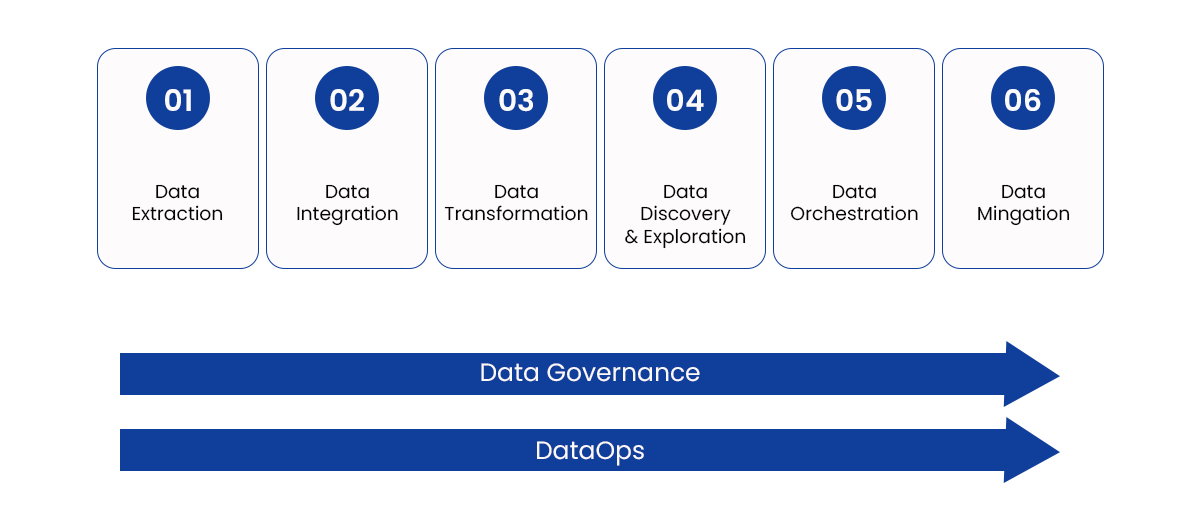How Generative AI can play its part in uplifting the entire data management lifecycle
May 22, 2024
The ever-growing mountains of data hold immense potential, but wrangling it into usable form remains a persistent challenge. The traditional data management life cycle, from extraction to utilization, is often labour-intensive, prone to errors and involves a lot of back and forth.
By automating tasks, identifying patterns, and even creating synthetic data, generative models are poised to transform every stage of the data life cycle, boosting efficiency, and accuracy, and unlocking hidden insights. This blog dives deep into how Generative AI can breathe new life into data management, empowering organizations to extract maximum value from their information assets.
We will be covering the potential application of Generative AI for an enterprise’s data management life cycle from integration to orchestration and migration.

1.Transforming data extraction with generative AI
Generative AI transformation has already taken data management to new levels. This translates to faster data collection, improved accuracy, and the ability to handle diverse data types. Generative AI can adapt to changing website structures during web scraping, infer data schemas from unstructured sources, and parse complex documents with human-like intelligence, ultimately leading to a more efficient and reliable data extraction process.
Some of the changing methods are:
Web scraping on autopilot: Web scraping involves extracting data from websites. Generative AI can automate this process by learning the structure and layout of websites. It can then adapt to changes in website design, ensuring continuous data collection.
Cracking the code of unstructured data: GenAI can analyze large datasets to understand the relationships between different data points and infer the underlying schema. This allows for the extraction of valuable insights from previously unusable data sources.
Parsing with precision: It can be trained on massive amounts of text data to understand context and relationships between words. This allows it to parse complex documents like contracts, financial reports, or scientific papers with high accuracy, extracting the relevant information needed for further analysis.
2. Bridging the gap: Generative AI in data integration
Data integration is the next phase in the data management life cycle that surely can be improvised with the GenAI application. Here are some potential ways to improvise the data integration:
Intelligent schema mapping and transformation: Generative AI can analyze data schemas and identify relationships between attributes, automating the mapping process. Additionally, it can perform data transformations like unit conversion or date formatting, ensuring seamless integration regardless of initial schema variations.
Entity resolution and matching: Generative AI can be trained on domain-specific data to understand subtle variations in entity representations. It can then identify duplicates and near-duplicates with high accuracy, ensuring clean and unified data for analysis.
Data unification and deduplication: Data unification involves combining data from various sources into a single, consistent dataset. Generative AI can automate deduplication by identifying and removing duplicate records based on advanced matching techniques.
3. Shaping the raw material: Generative AI in data transformation
After the integration phase, the artificial intelligence applications can play a vital role in data transformation, eliminating back-and-forth processes and minimising the need for technical roles at each stage.
Cleaning up and refining: Data cleansing involves identifying and correcting errors, inconsistencies, and missing values within a dataset. Generative AI can analyze data patterns and learn to detect anomalies, automating data cleaning tasks like identifying outliers or formatting inconsistencies.
4. Generative AI in data discovery and exploration
Faster data discovery, enhanced understanding of data, and data-driven decisions for the future are some of the values that GenAI can add to Data discovery and transformation processes. Furthermore, Generative AI can tackle complex challenges of data discovery and exploration. Some of them are:
Data profiling: Data profiling, the foundation for understanding your data, receives a major boost from Generative AI. Manual inspection becomes a relic of the past as GenAI analyzes vast datasets, automatically generating comprehensive summaries including data types, value distributions, and statistical measures.
Interactive data visualization: Generative AI can be used to create dynamic and interactive data visualizations that adapt to user interaction, allowing for a more intuitive exploration of complex datasets.
Data anomaly detection: Generative AI can be trained to identify data points that deviate from the norm, potentially leading to the discovery of outliers or hidden patterns that traditional methods might miss.
Synthetic data generation: For datasets with privacy concerns or limited data points, generative AI can create synthetic data that mirrors real-world characteristics. This allows for safe exploration and experimentation without compromising sensitive information.
5. Generative AI breathes new life into data orchestration
Data orchestration, the art of automating data workflows, is experiencing a significant transformation with the introduction of GenAI. Here are some stages where AI can add value to Data orchestration process:
Workflow automation on Autopilot: GenAI steps in by learning from historical data and workflow patterns. It can then automatically generate or recommend optimal workflow structures, identifying dependencies and data transformations needed between tasks.
Intelligent task scheduling for peak efficiency: Traditional scheduling often relies on static rules or human intervention. By analyzing resource constraints, historical performance data, and task dependencies, GenAI can recommend optimal task scheduling.
Proactive debugging and self-healing workflows: Errors and unexpected issues are inevitable in complex data pipelines. GenAI steps up by analyzing error logs and historical data to identify common errors and predict potential problems.
6. Generative AI streamlines data migration with unparalleled efficiency
Data migration, the process of transferring data between storage systems or formats, can be a complex and error-prone endeavour in many cases. Here's how GenAI revolutionizes data migration:
Automated documentation: Manually documenting data structures and schemas is a laborious task. GenAI steps in by analyzing existing data sources and automatically generating comprehensive documentation. This includes data lineage, data types, constraints, and relationships.
Data-driven migration rationalization: Justifying the need for data migration can be challenging. GenAI can analyze data usage patterns and identify data that is rarely accessed or no longer relevant.
Enhanced data quality and error handling: Data quality issues can derail migration efforts. GenAI analyzes source data to identify and predict potential data quality problems like missing values, inconsistencies, or invalid formats.
Streamlined post-migration validation: Verifying data accuracy after migration is crucial. GenAI can automate the process by comparing source and target data sets, identifying discrepancies, and highlighting potential issues.
Generative AI is now Imperative in a robust data management lifecycle
As AI continues to evolve, we can expect even more groundbreaking applications within data management. Generative models will become even more sophisticated, tackling complex challenges and automating processes with even greater accuracy. The future of data management is undoubtedly intertwined with the continued development of AI, paving the way for a future where data truly unlocks its full potential to drive informed decision-making and innovation.
Ready to harness the power of AI for your organization?
Contact Systems Limited today and discover how our Generative AI services can streamline your data workflows, improve data quality, and generate deeper insights. Our team of experts will work closely with you to understand your unique needs and develop a customized AI strategy that propels your business forward.
Quick Link
You may like
How can we help you?
Are you ready to push boundaries and explore new frontiers of innovation?


